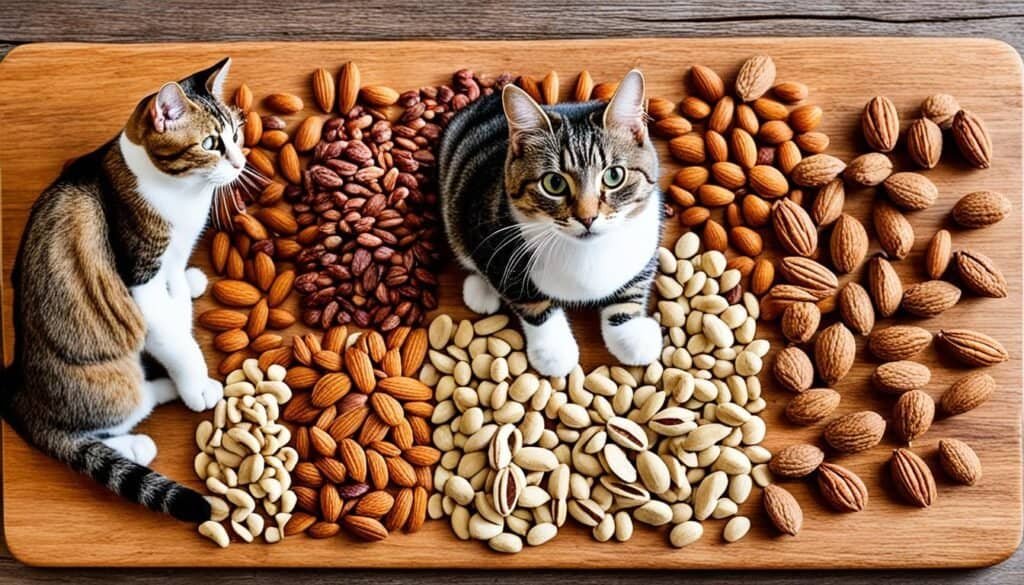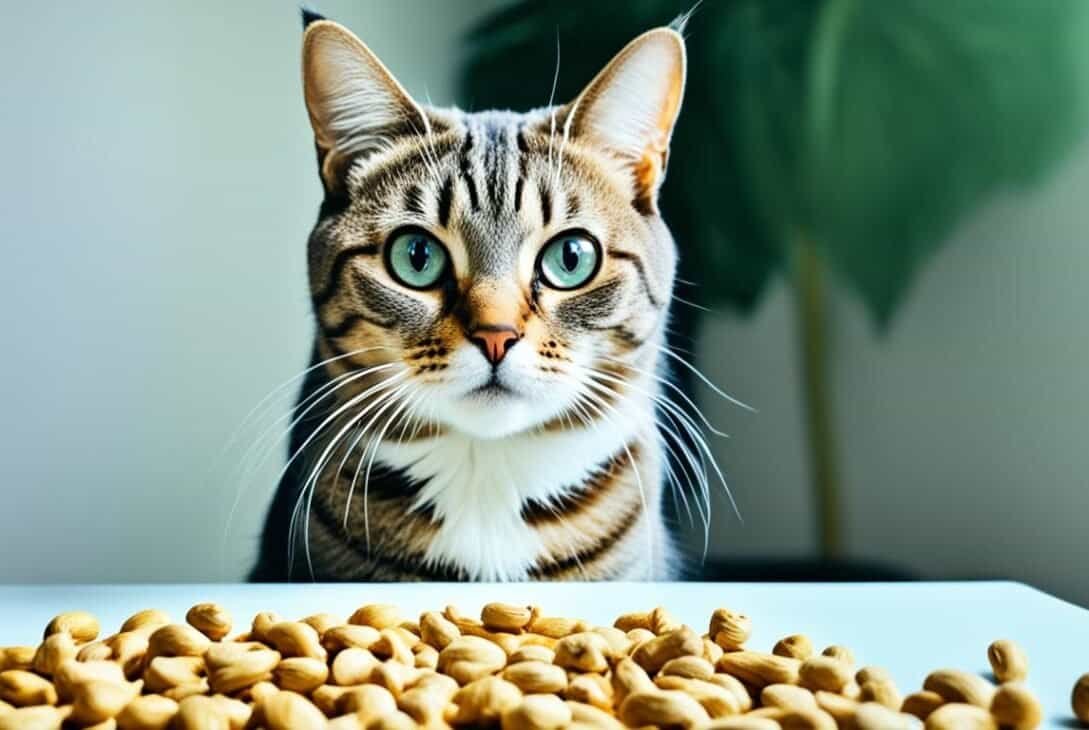Cashews are a favorite snack for us. But, can cats safely enjoy these nuts too? This guide will look into if cats can eat cashews. It will also cover the risks and offer tips for a safe cat diet. By the end, you’ll know if cashews are okay for your cat.
Key Takeaways
- Cashews can be risky for cats, causing stomach problems and allergies.
- Cats are better off not eating cashews and most other nuts because they’re fatty and could be toxic.
- There are safe, nut-free snacks for cats that you can give them.
- It’s important to talk to your vet about your cat’s diet and nutrition needs.
- Keeping cashews and other harmful foods away from your cat is the best way to protect them.
Understanding Cashew Nuts and Cat Nutrition
To understand how cashews might affect cats, we should first look at what cashew nuts are. Cashew nuts come from the fruit of a cashew tree, offering a smooth texture and light taste that people enjoy. But for our cats, the health aspects of cashews are something different to consider.
What are Cashew Nuts?
Cashew nuts are grown on a tropical tree in places like Brazil. They’re known for their buttery and slightly sweet taste. This makes them great for all kinds of food. Even though cashews are good for humans, we need to think about how they impact a cat’s health.
Nutritional Value of Cashews
Cashews are full of good things like protein, healthy fats, and several important vitamins and minerals. These include vitamin K, vitamin B6, magnesium, phosphorus, and copper. While these are great for people, cats have very different needs and ways of digesting food.
It’s key to know what’s in cashew nuts to see if they’re good for cats. Next, we’ll look at any possible dangers or problems with cats eating cashews.
Can Cats Have Cashews?
Cashews might seem like a tasty snack for people. But, can cats safely eat them? This is an important question for those who own pets. We’ll look into the risks of giving cashews to cats.
Potential Risks and Concerns
Cashews carry a few health risks for cats, as do other nuts. Their high fat and calorie levels can cause stomach problems. This includes issues like vomiting, diarrhea, and pancreatitis if cats eat too many. Cats can also be allergic to nuts, leading to breathing problems. Moreover, the shells of cashews have a toxic substance called urushiol. If a cat eats this part, it can be very harmful.
Signs of Cashew Toxicity in Cats
If a cat eats cashews, watch for any signs of being unwell. They might become sluggish, lose their desire to eat, vomit, have diarrhea, or find it hard to breathe. Sometimes, they might have seizures or even fall into a coma. In case you believe your cat has eaten cashews, don’t wait. Get them to a vet right away. This is the best way to protect your cat’s health.

Alternatives to Cashews: Safe Nuts for Cats
Cashews are not a top choice for your cat. But, there are many other nuts that are safe and healthy. Cat-friendly nuts and nut-free treats are available for a balanced diet.
Nut-Free Options for Cat Treats
If your cat can’t eat nuts, there are tasty alternatives. Fruits like bananas, blueberries, and watermelon are great as they’re low-calorie and full of nutrients.
Meats like chicken, turkey, or tuna are good protein sources. They don’t have the same risks as nuts do. Veggies such as carrots, green beans, and sweet potatoes are crunchy and healthy. Nut-free options let your cat have a pleasant and secure treat time.

Preventing Accidental Cashew Ingestion
We all love our cats and want to keep them safe. That’s why it’s important to act early. Cashews are tasty, but they can be harmful to cats. They might cause stomach problems or even be toxic. To keep your cat healthy, make sure they can’t get to cashew nuts.
Keeping Cashews Out of Reach
Step one is to put cashews where your cat can’t find them. Use airtight containers or high cabinets. Also, watch out where you leave snacks. Cats are curious and might try to get to them. A home without cashews is safer for your furry friend.
Monitoring Your Cat’s Diet
After hiding the cashews, you need to check what your cat eats. Always look at the snacks to make sure they’re safe. Watch for any strange behavior or symptoms. If your cat looks sick, see the vet right away. Keeping a close eye on their food can help keep them happy and healthy.
Consulting with Your Veterinarian
When thinking about giving your cat cashew nuts, consulting your vet is key. They provide personalized advice. This advice considers your cat’s health, needs, and diet.
Vets are experts who understand the risks and benefits of new foods like cashews. They guide on how much to give, any potential allergies, and the nuts’ effect on nutrition. Trusting their advice ensures your cat stays healthy and happy.
Even though cashews might be safe for cats, some cats could react badly. Your vet will help tailor a safe and nutritious diet. This plan will be unique to your cat’s health and well-being.
FAQ
Can cats have cashews?
What are the risks of feeding cashews to cats?
How can I tell if my cat has consumed cashews?
What are some safe nut alternatives for cats?
How can I prevent my cat from accidentally consuming cashews?
When should I consult my veterinarian about my cat’s diet?
Can cats eat nuts? Cashews and cat health Cat-friendly snacks Cats and cashews Feline diet Nutritional needs of cats Pet dietary guidelines Safe human foods for cats
Last modified: May 14, 2024







